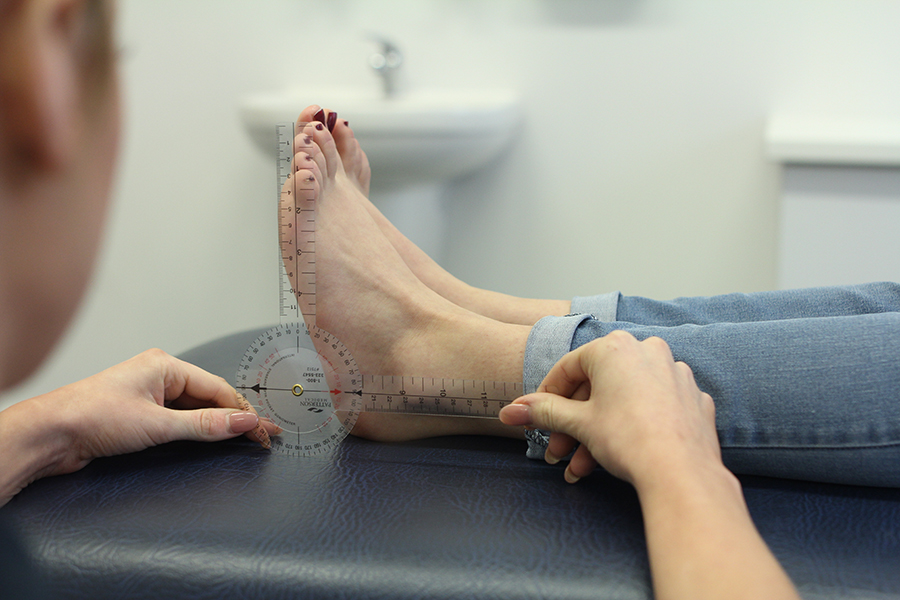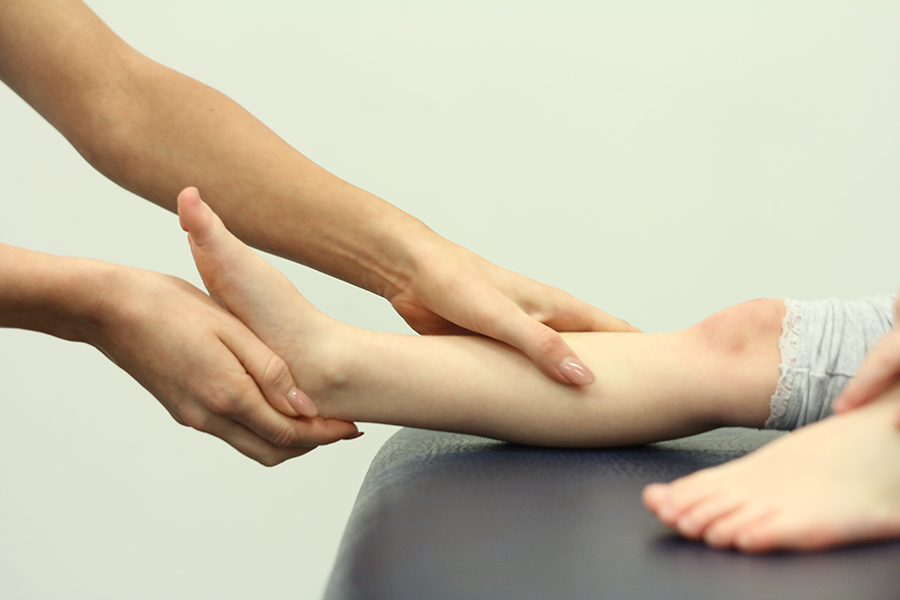Morton's neuroma
Morton's neuroma is an area of thickening and inflammation of the digital plantar nerve. Morton's neuroma can be an extremely painful condition, and as a result it may prevent you from participating in the activities that you want to do.
If you think you have a Morton's neuroma you should visit a podiatrist. Podiatrists are experts in the foot and lower limb, they will be able to discuss your condition with you and devise a treatment plan that will aim to alleviate any painful symptoms caused by the neuroma.
Morton's neuroma is a painful condition of the foot; it is what is known as a paroxysmal neuralgia. Paroxysmal means that attacks are frequent, and neuralgia means that the pain is caused by either damage or irritation to a nerve. Morton's neuroma occurs in the web space of the toes, most commonly the space between the third and fourth toe.
Morton's neuroma occurs due to an irritation of a nerve in the foot called the plantar digital nerve. The plantar digital nerve divides in order to supply the inside of the third and fourth toe, at this point the nerve can get irritated due to compression from the metatarsal bones (which the nerve sits between). Irritation of the nerve causes inflammation of the nerve sheath and the result is a thickening of the nerve; this is a neuroma. When the neuroma is compressed it causes pain.

The following signs and symptoms are characteristic of a Morton's neuroma:
A podiatrist will be able to diagnose a Morton's neuroma. Diagnosis of Morton's neuroma is made based on the physical signs and symptoms and an examination.
If you have a Morton's neuroma, following assessment and treatment at Chiropody.co.uk you can expect the following benefits:
The podiatrist will begin by obtaining a thorough medical and social history; they will then examine the area and perform a variety of tests which are diagnostic for Morton's neuroma. Once a diagnosis has been made and other conditions have been ruled out, the podiatrist will discuss possible treatment options with you. Treatment for Morton's neuroma will depend on the underlying cause; therefore any treatment will be specific to you.
Treatment for Morton's neuroma may include one or more of the following:

Morton's neuroma is a painful condition of the foot. The pain associated with Morton's neuroma is referred to as neuralgia; this means that the pain is caused by either irritation or damage to a nerve.
In Morton's neuroma the nerve can thicken as it divides, which it does in order to supply the inside of the third and fourth toe. The thickening is caused by compression of the nerve between the metatarsals, which irritate the nerve and cause it to thicken; the resultant thickening is a Morton's neuroma.
The characteristic signs and symptoms of a Morton's neuroma include sharp and/or burning pain that can radiate to the top of the foot and tingling/numbness in the toes.
There are a variety of treatment options available for Morton's neuroma, and the one most suitable for you will depend on the initial cause. Visit a podiatrist who will be able to advise you on the treatment option best for you.
To arrange an assessment with one our podiatrists please email office@chiropody.co.uk or call 0330 088 4222..
If you think you have a Morton's neuroma you should visit a podiatrist. Podiatrists are experts in the foot and lower limb, they will be able to discuss your condition with you and devise a treatment plan that will aim to alleviate any painful symptoms caused by the neuroma.
What is Morton's neuroma?
Morton's neuroma is a painful condition of the foot; it is what is known as a paroxysmal neuralgia. Paroxysmal means that attacks are frequent, and neuralgia means that the pain is caused by either damage or irritation to a nerve. Morton's neuroma occurs in the web space of the toes, most commonly the space between the third and fourth toe.
What causes Morton's neuroma?
Morton's neuroma occurs due to an irritation of a nerve in the foot called the plantar digital nerve. The plantar digital nerve divides in order to supply the inside of the third and fourth toe, at this point the nerve can get irritated due to compression from the metatarsal bones (which the nerve sits between). Irritation of the nerve causes inflammation of the nerve sheath and the result is a thickening of the nerve; this is a neuroma. When the neuroma is compressed it causes pain.

What are the signs and symptoms of Morton's neuroma?
The following signs and symptoms are characteristic of a Morton's neuroma:
- Tingling or numbness in the toes
- Feeling as though you are walking on a pebble
- Pain, which is described as sharp or burning. The pain can sometimes radiates to the top of the foot
- Tight footwear can worsen symptoms
How is Morton's neuroma diagnosed?
A podiatrist will be able to diagnose a Morton's neuroma. Diagnosis of Morton's neuroma is made based on the physical signs and symptoms and an examination.
Benefit of podiatry for Morton's neuroma
If you have a Morton's neuroma, following assessment and treatment at Chiropody.co.uk you can expect the following benefits:
- Decrease in pain
- Decrease in inflammation
- Decrease in neurological symptoms (e.g. numbness, tingling)
- Improved lower limb and foot mechanics
- Cause, not just symptoms treated
- Improved gait
What would podiatry for Morton's neuroma involve?
The podiatrist will begin by obtaining a thorough medical and social history; they will then examine the area and perform a variety of tests which are diagnostic for Morton's neuroma. Once a diagnosis has been made and other conditions have been ruled out, the podiatrist will discuss possible treatment options with you. Treatment for Morton's neuroma will depend on the underlying cause; therefore any treatment will be specific to you.
Treatment for Morton's neuroma may include one or more of the following:
- Orthoses
- Steroid injection
- Taping
- Advice and education
- Footwear review
- Padding
- Anti-inflammatory advice
- Rest
- Surgery (in severe cases)

Summary
Morton's neuroma is a painful condition of the foot. The pain associated with Morton's neuroma is referred to as neuralgia; this means that the pain is caused by either irritation or damage to a nerve.
In Morton's neuroma the nerve can thicken as it divides, which it does in order to supply the inside of the third and fourth toe. The thickening is caused by compression of the nerve between the metatarsals, which irritate the nerve and cause it to thicken; the resultant thickening is a Morton's neuroma.
The characteristic signs and symptoms of a Morton's neuroma include sharp and/or burning pain that can radiate to the top of the foot and tingling/numbness in the toes.
There are a variety of treatment options available for Morton's neuroma, and the one most suitable for you will depend on the initial cause. Visit a podiatrist who will be able to advise you on the treatment option best for you.
To arrange an assessment with one our podiatrists please email office@chiropody.co.uk or call 0330 088 4222..
Save 5% by booking an appointment online.

Find your nearest clinic
We have clinics located throughout the North West. We also provide a home visit service.
Find out more »

No waiting lists!
Tired of waiting for treatment? Be seen by a podiatrist today!
Find out more »

Not sure how we can help?
Speak to a podiatrist to find out how we can help. Call us on 0330 088 4222.
Find out more »
We work with:

Individuals

Organisations

Health professionals
Get in Touch!
0330 088 4222
If you would like to speak to one of our specialists then please complete this form.
We are open 7 days a week








